Austin S. Camacho's Blog, page 2
July 21, 2019
Back to Query Letters
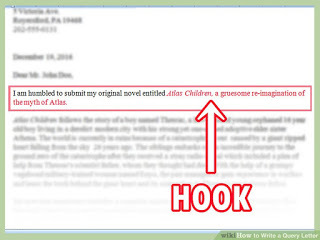 A couple of weeks ago I blogged on what we at Intrigue Publishing want to see in a query letter. I have since been reminded that I bypassed some basics. I’ll now try to fill in the spaces.soso
A couple of weeks ago I blogged on what we at Intrigue Publishing want to see in a query letter. I have since been reminded that I bypassed some basics. I’ll now try to fill in the spaces.sosoYou need to include the genre of your work in the query letter. We want to know who your target audience is, and to be sure you’ve written something in a genre we publish (which of course is stated clearly in our submission guidelines.
We also need to know the word count, so we know your book fits with the expectations of your genre’s readers. Don’t send us a Young Adult novel that’s 50,000 words. It’s too short for the genre. We might consider one that’s 60,000 words, but a mystery or thriller needs to be 80,000 to 100,000. And it’s awkward when the word count isn’t rounded up or down. Take it to the nearest thousand words.
Also, avoid confusing us in the letter. If your novel contains a lot of elements just tells us about the ones that relate to the primary conflict or the book’s dramatic question. Also, tell us if the book is told from multiple points of view. We want to know who’s story it is.
Finally, remember that not even a perfect query letter guarantees acceptance. If a publisher rejects your work, that just means it’s time to submit to someone else.
Published on July 21, 2019 18:58
July 9, 2019
Panelling - Don't Be Wooden
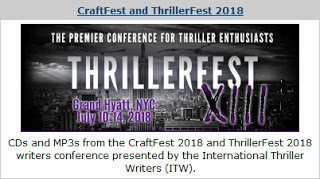 In a couple of days I'll arrive at Thrillerfest, one of my favorite writers conferences. Because it's in New York, the center of the publishing universe, Thrillerfest attracts a number of agents, editors, and other industry professionals. So when you're sitting on a panel at this one, you're not just talking to fellow authors and eager fans. You're in front of a few people you might seriously want to impress.
In a couple of days I'll arrive at Thrillerfest, one of my favorite writers conferences. Because it's in New York, the center of the publishing universe, Thrillerfest attracts a number of agents, editors, and other industry professionals. So when you're sitting on a panel at this one, you're not just talking to fellow authors and eager fans. You're in front of a few people you might seriously want to impress.At our own Creatures,Crimes & Creativity Con we want to give every writer a chance to shine, so we keep panels down to three or four people. At Thrillerfest it is not uncommon to see six or seven writers on a panel, plus a moderator who may contribute to the conversation. Plus, every panel is likely to have one or two very recognizable names. Or at least names more familiar then yours. SO, how do you make the best of your panel time.
First, it’s important to prepare. Check the title of your panel. I’m on one this year about creating suspense. Decide what the most obvious questions are for the moderator to ask. How do you define suspense? Why is it important? Where in YOUR book did you use suspense?
When you have six or seven questions you’re likely to hear on the panel, compose clear, concise answers to them. Be able to make your point in less than a minute. A minute can seem like a long time when you’re talking and trust me, the audience feels it too. Longer answers will make it look like you’re hogging the stage. The only thing worse is saying nothing. (actually, the WORST thing is to pause for thirty seconds figuring out an answer.)
So you’re ready for the moderator to call on you. You’ll sound confident because you know your response in advance. But what do you do when you’re not talking? To be an audience pleaser, try to me actively polite. That means listening to, and looking at, whoever is talking. Don’t jump in just because they sparked a thought in your head. And smile! The audience thinks you should be having fun up there.
If you’ve read the work of any of the other panelists it’s cool to mention their title when your turn comes. If they mention your work, accept the compliment graciously. The panel is a team with the shared goal of making the audience happy. Promoting each other is a nice way to reach both goals. And if one of the panelist says something you disagree with, respect his or her view and offer concrete reasons why your view differs. Fans and industry insiders will respect a healthy debate. Just know the difference between a debate and an argument.
And if you’re coming to Thrillerfest, please stop by to see one of my panels on Friday. Trust me, we’ll have a good time!
Published on July 09, 2019 13:46
July 1, 2019
Reading Query Letters
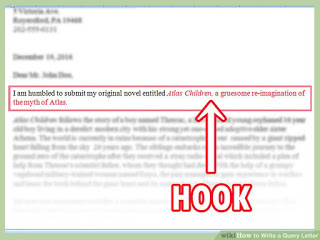 With my publishing hat on, reading queries is part of the job. Sometimes it can be a joy – when I pick up a gem about a book that screams “read me!” On the other hand, often it’s drudgery of the worst sort. So maybe this is self-serving but if you want to submit to Intrigue Publishing, please consider some of what I’ve learned are the keys to making me say “send the manuscript.”
With my publishing hat on, reading queries is part of the job. Sometimes it can be a joy – when I pick up a gem about a book that screams “read me!” On the other hand, often it’s drudgery of the worst sort. So maybe this is self-serving but if you want to submit to Intrigue Publishing, please consider some of what I’ve learned are the keys to making me say “send the manuscript.”First and foremost, understand that a query letter is not a synopsis. It is, in fact, a sales pitch. So the focus should not be on telling me what the story is, but instead on telling me why people will want to read that story. Don’t just tell it. Sell it.
Most novelists have figured out that their letter needs a good hook line. That is what pulls me in. But then what? Well, if you’re a thriller or mystery author, show me you understand your audience. Show me a satisfying twist at the end. That will make me want to read your book.
Now for thrillers, mysteries or even Young Adult novels, the strength of the story is tied to what the hero can win or lose. In other words, what is at stake. Make sure you tell me clearly what the stakes are, and if they can’t be big (if we don’t stop him, he’ll start World War III) then make sure it’s personal (If we can’t stop him, he will be pushed into a life as a gang banger forever.)
Now for all fiction genres, but especially for our romance submissions, keep in mind that there is no new story. Since every story you can imagine has been told before, it’s vital that you find a way to show how YOUR version of this story is unique. Tell me about that twist on the familiar story that will surprise me. How is your protagonist different? What about your voice is one-of-a-kind in this genre? And if you can’t find what’s different about your take on this story… don’t query us.
At the same time, let me know how your books is like what’s already out there. For marketing purposes, we need to know about comparable titles. So give me comparisons so I know for sure that you know what’s hot in your genre. If your thriller will appeal to fans of Jeffrey Deaver and John Sandford I know who the audience is. If your romance is Outlander in space or you have a mystery that is Sherlock Holmes meets The Saint, I have good marketing hooks.
I have a few more tips to share, but they’ll have to wait until next week.
Published on July 01, 2019 18:53
June 24, 2019
The Attraction… and Fear…. of the New
 Those who follow me know that I write a long-standing series about a private eye named Hannibal Jones. My readers and I are very comfortable with Hannibal. There’s also the series featuring Morgan Stark and Felicity O’Brien. Five adventures later those stories roll our fairly easily too.
Those who follow me know that I write a long-standing series about a private eye named Hannibal Jones. My readers and I are very comfortable with Hannibal. There’s also the series featuring Morgan Stark and Felicity O’Brien. Five adventures later those stories roll our fairly easily too.That’s the beauty of writing series: Familiar characters who are fully formed allow a writer to focus on the plot. And readers know what to expect.
But sometimes a writer wants some surprises. There is an attraction to inventing a new cast of characters and seeing where they take you. Which is why the novel I most recently finished follows a character who is very different from any protagonist I’ve written. She is not a hero in any way. In fact, she’s a professional assassin.
Skye came to me as the focus of a short story for the Smart Rhino collection called “Insidious Assassins.” I’ll admit I was proud of the story, and that Skye wouldn’t leave my mind. She wanted more room to expand. Of course the wonder of short stories is that characters don’t have to have extensive backstories, and you don’t need to know details of their lives (like where they live, who their friends are or what they do in their off time.)
As I launched into the story I had in mind for my new character she began to deepen and develop. She doesn’t have a partner, per se, but she does have a confidente – her psychiatrist. This turned out to be a fun way to reveal character. The story moved quickly, and the action branded it a thriller reminiscent of the paperbacks I used to read in college (The Destroyer series, the Executioner books, etc.)
However, I was also feeling all the downsides of starting over. I had to really think through everything the character did. She was not at all familiar. In fact, I was working with a stranger who frequently did not react as expected. Plot points had to be adjusted to bring our protagonist to the places she needed to be.
And there is that last fear: what if my readers don’t like Skye as much as I do? What if in the 21stCentury a killer-for-hire as the protagonist is too much of a stretch for fans? What if these stories aren’t what my readers want? Well, ultimately the character attracted me. The story drew me. So now I have to accept the fear as well.
Published on June 24, 2019 17:08
June 18, 2019
Why Genre Matters
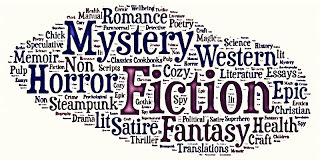 At the first couple of writer’s conferences I attended I asked authors what to call my first book. Mystery? Thriller? Suspense? I was told more than once that “genre” was a publisher’s invention, of value only to the marketing team.
At the first couple of writer’s conferences I attended I asked authors what to call my first book. Mystery? Thriller? Suspense? I was told more than once that “genre” was a publisher’s invention, of value only to the marketing team.I’ve since learned to view that fact from the other side. Yes, it’s a marketing tool, in that it helps sell books by letting readers know if they want what you write. Genre is a way to help your natural audience find your book.
Each genre has specific conventions that readers expect. If you write genre fiction, it pays to meet those reader expectations. Sure, the best known authors wander far from those expectations but if you’re starting out it’s a lot easier to build a readership by writing a book that fits exactly into your genre. Hopefully you’re writing what you love to read, which should mean you know what those conventions are.
I write private eye mysteries. I know the kind of character my readers want, a detective who’s dedicated to his client and to finding the truth. These detectives live in a dark, unforgiving world and will get violent when they need to. They’ll get knocked out but seldom show the results of repeated concussions. And in the end, the bad guy will ALWAYS get punished.
On the other hand, Penny Clover Petersen writes cozy mysteries. Readers expect her amateur sleuths to be, and meet, quirky characters. There will be no blood or gore, and little profanity (unless it lends itself to humor.) She stays within those lines but still manages to create unique and unforgettable stories.
Each genre has dedicated fans who read several books every month. Staying in your genre gives you a guaranteed audience, assuming you write good stories with interesting characters. When I hear a writer say her story has something for everyone, or that it will appeal to every reader, what I hear is “I don’t know who my audience is.” And if a reader who picks up your book isn’t sure if it’s focus is on being a paranormal fantasy or historical romance or a traditional whodunnit, they, will most likely put it back down and look elsewhere.
In my experience, all the plusses of sticking to a clear genre are magnified if you decide to write a series. After the first book, everything is established. Readers are already familiar with the setting, they know your main character, and the secondary characters are expected. And in terms of sales, it’s easier for readers to find your follow-on books because series take up more space online. And once you’ve hooked them, they’ll search out your books.
So remember – fiction genres are your friend! Stick with them.
Published on June 18, 2019 14:27
June 9, 2019
Where ELSE Do Reviews Come From
 Authors know that third party endorsements, otherwise known as reviews, are key to book sales. They represent the word-of-mouth push that is the most important piece of marketing. Last week I talked about many mainstream reviewers but there are other options.
Authors know that third party endorsements, otherwise known as reviews, are key to book sales. They represent the word-of-mouth push that is the most important piece of marketing. Last week I talked about many mainstream reviewers but there are other options.Amazon reviewers might comment on your book at any time. The Amazon Top Reviewers carry quite a bit of clout, so it’s smart to pursue them soon after your book is released. When you approach them, you need to be thoughtful and courteous. You can’t assume you’re owed a review. Just send an introductory email with a little of your background and ask if they would accept a complimentary copy of your book. Ask if they prefer hard copy or an electronic copy. Just remember that you’re asking a big favor of a stranger. So be sure to send a thank you note if you do get a review. And afterward, vote that the review was helpful.
Another group to start pitching early is bloggers. Most of them list pretty specific guidelines and you need to stick to them closely.
You can find these bloggers on several directories, for example http://www.theindieview.com/indie-reviewers, /http://bookbloggerlist.com/and https://bookrevieweryellowpages.com/. However, these lists get outdated faster than the owners can update them so it’s a good idea to Google “book bloggers” and do a search on Twitter.
Don’t send a mass email. Bloggers appreciate emails addressed personally to them. Mention a recent review so they know you have read their blog. Otherwise, everything I said about approaching Amazon reviewers applies.Of course, reviews from readers are priceless and the more your book has, the better it will sell. But unlike bloggers or Amazon reviewers, you can’t send a note to each person who reads your book asking for a review.
Or can you?
Adding a letter to the back of your book addressed to the reader, inviting them to contact you, brings them right to you. It’s a good place to mention any awards won. And this is where you can ask them politely for a book review. In your letter, remind your reader that you need their help and they would be helping you a great deal if they were to post an honest review. Include the link to your book on Amazon so it’s easy for the reader to get directly to the right place to leave the review.
A wise reader will reach out to people in all the groups I’ve mentioned in this blog and the last. One thing no author has ever had is too many reviews.
Published on June 09, 2019 17:52
June 6, 2019
Reviews: Do you Really Like Me?
 At Intrigue Publishing we send 25 Advance Reader Copies of each new book to a carefully curated list of reviewers. Why? Because ultimately, almost all books sales are the result of a personal recommendation, and reviewers are powerful recommenders. However, some of our books might get one or two reviews while others get 10 or 12. I’d love to know why… but it remains a mystery to me. We were stunned when we got the first couple of Publishers Weekly reviews, and just as stunned when other books were ignored.
At Intrigue Publishing we send 25 Advance Reader Copies of each new book to a carefully curated list of reviewers. Why? Because ultimately, almost all books sales are the result of a personal recommendation, and reviewers are powerful recommenders. However, some of our books might get one or two reviews while others get 10 or 12. I’d love to know why… but it remains a mystery to me. We were stunned when we got the first couple of Publishers Weekly reviews, and just as stunned when other books were ignored.One thing we DON’T do is pay for book reviews. I have always been skeptical of the value of praise that you paid someone to give. However, I can’t deny the truth that there are a lot more books coming out than the reputable reviewers could possibly read and paying the reviewer is one way to move to the front of the line.
Of course, authors can pursue reviews without their publisher’s backing, but those who choose to pay for them need to look closely at the sources. There are paid review sources that are held in pretty high esteem. Kirkus Reviews is probably at the top of that list, followed by IndieReader, BlueInk Review and a few others. Readers may not know, or even care, that you paid someone to review your book.
Before paying for a review, consider the quality of reviews you’ve seen from that source, and how many people will see it without your efforts. As an example, IndieReader offers more exposure for better books. They posts reviews on their site and they are shared by Ingram. Books that get a 4 or 5-star rating are included in a “Best Of” round-up on their site every month and are pushed to an email list of about 5,000 readers.
Quality matters, in part, because if Amazon doesn’t think your review is legit they’ll delete it. Short reviews that don’t refer specifically to some aspect of your book could disappear. “Great read by this exciting author” could apply to any book. This is the kind of thing Amazon may well pull down.
Of course, the most treasured reviews are from professional sources, but they tend to want the book well in advance. When authors ask us why it takes so long to bring their books to market I mention, in part, that if you want a review from Publishers Weekly, the New York Times, the New York Review of Books, the Wall Street Journal and other professional publications you have to get the book to them four months to six months prior to release. It is of course a crap shoot, but it’s well worth the wait for a chance to be reviewed by any of these sources.
We’ll explore getting reviews in more detail next week.
Published on June 06, 2019 12:47
May 26, 2019
To Blurb or Not to Blurb
 As an author I greatly value blurbs for my books. A “Blurb” is a short description of a book, a review written for promotional purposes. Blurbs from other authors are valuable, but they are even more valuable if those authors write in my genre or can be viewed as subject matter experts for some reason. So, when I wrote The Orion Assignment, a thriller set in Ireland with a native Irish protagonist, I thought the blurb I got from native Irishman and crime fiction author Ken Bruencarried a lot of weight for potential readers. Beyond saying that he liked my book, it sent the message that I got the Irish characters and setting right.
As an author I greatly value blurbs for my books. A “Blurb” is a short description of a book, a review written for promotional purposes. Blurbs from other authors are valuable, but they are even more valuable if those authors write in my genre or can be viewed as subject matter experts for some reason. So, when I wrote The Orion Assignment, a thriller set in Ireland with a native Irish protagonist, I thought the blurb I got from native Irishman and crime fiction author Ken Bruencarried a lot of weight for potential readers. Beyond saying that he liked my book, it sent the message that I got the Irish characters and setting right.And what about the subject matter expert angle. If someone requests a blurb from me because their protagonist is ex-military, or African American, or a senior citizen, are they taking advantage of me? After all, they hope my endorsement will increase sales. And is my third-party endorsement a lazy way around doing their research? Don’t they have any ex-military, or black, or older friends of their own to show their manuscript to?
Well, just because they asked me doesn’t mean they haven’t already gotten other experts or members of those groups to read their book. But maybe my voice will carry more weight than theirs. Or maybe he trusts my feedback more than theirs.
That’s a lot of maybe. But I do feel a responsibility to repay the universe for all the blurbs big-name authors have written for me. And I feel a responsibility to help other writers I respect to get their seniors, ex-soldiers and African American characters right. But it’s still me doing a favor for another author, so in general my rule is simple. It’s something I do for writers who are respected friends.
Published on May 26, 2019 14:20
May 20, 2019
Make Your Protagonist Shine
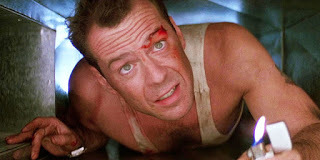 Sometimes we at Intrigue Publishing receive a manuscript from an author who tells a great story, writes wonderful prose and has a fine touch for dialog, yet we have to reject the book. Despite all else being perfect, a weak protagonist will sink a novel.
Sometimes we at Intrigue Publishing receive a manuscript from an author who tells a great story, writes wonderful prose and has a fine touch for dialog, yet we have to reject the book. Despite all else being perfect, a weak protagonist will sink a novel.To be clear, I’m not talking about a weak hero. In fiction, heroes often have astonishing abilities, although anyone who does good deeds for others can be a hero. The protagonist is always the subject of the story. It’s the person who the story is about. He or she is the person who grows the most, takes the big risks and makes the big sacrifices. If those things don’t happen your protagonist is a weak one, even if he’s Hercules or Superman.
The very center of every story is change, and that has to revolve around your protagonist. In some stories, especially science fiction, it is common for the protagonist to change his world. More commonly, it is the hero who changes, grows, matures or learns an important lesson. This is why you often hear that a hero needs to be flawed. Your protagonist should at least start out with serious flaws. In the best stories, the obstacles the hero overcomes during the story teach him to overcome those flaws.
Also, a good protagonist is not ALWAYS positive. Neither Indiana Jones nor James Bond is a cheerleader. They know the world is tough and they have to be tougher. Like all of us, your hero needs to have an off day once in awhile, and make the occasional stupid mistake. And when he makes those mistakes, he should learn something from them. That’s a lot of what leads to the growth. (It took Dorothy a lot of missteps to realize there’s no place like home.)
You should also make sure your hero’s personality is the result of his or her past experience. You need to know this person so well that you know exactly what caused him to be the way he is. And at an appropriate time you can share that with the reader to officer added insight.
And, since this is the focal character, your protagonist needs to be the person who drives the plot. This is the person who walks headlong into the greatest danger. Who takes the big risk, who makes the big decision. And ultimately, this is the person who undoes the villain. Gotham City has a huge police force, but it’s Batman’s story so it must always be Batman who ultimately defeats the Joker.
If you can do all this in your story, you can be sure your protagonist will shine!
Published on May 20, 2019 13:51
May 5, 2019
Leave Your Novel's Past in the Past
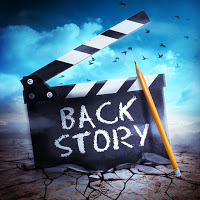 When I teach my class on creating characters I stress that the author needs to know everything about the people he creates including their entire life history. But as I read submissions to Intrigue Publishing it occurs to me that I should put more emphasis on the fact that you need not share all you know with the reader.
When I teach my class on creating characters I stress that the author needs to know everything about the people he creates including their entire life history. But as I read submissions to Intrigue Publishing it occurs to me that I should put more emphasis on the fact that you need not share all you know with the reader.The thing about backstory is, it isn’t always relevant to your current story. As a reader I want to story to keep moving forward. If you stop to explain too much history, it just slows things down.
There’s a reason we reject novels with what we consider too much backstory. In real life, people just don’t think about past events that often, unless they’re tied directly to something that’s happening to them right then. If the writer is solidly in his or her point of view character’s head, they will know what past events are relevant to the moment.
No matter how fascinating it is to the writer, readers don’t really want to know all about the character’s past. Readers want to be surprised from time to time. They want to discover more about the character as the story unfolds. So it’s more fun to drop hints to the past. As a reader I like to be thinking, “why did she react so strongly to that? Why did he say that? Why did he laugh at THIS situation?”
My best advice to writers is to write the whole story without ANY backstory. Just ignore it and let the characters do what they do. They, when you go back to read through the manuscript for your first re-write look for places where the scene doesn’t make sense unless you give the reader more information. If they need that backstory to understand the scene, find a place to reveal it. If it doesn’t really help that scene, you can reveal it later so the reader gets a chance to say, “Ah! So THAT’S why…”
I think important backstory is defined by how it affects the character now. It’s not about recorded history. It’s about the impact of that experience. For example: My detective Hannibal Jones listens to a lot of Classic Rock. I show this to the reader and let another character ask about it later on. That gives Hannibal a reason to reveal that he grew up in Germany listening to the American Forces Network radio. He was a child when his father died, and he had clung to the mix of music AFN played in those days.
So put that backstory in the background and help your readers (and editors) enjoy your story more.
Published on May 05, 2019 18:32



